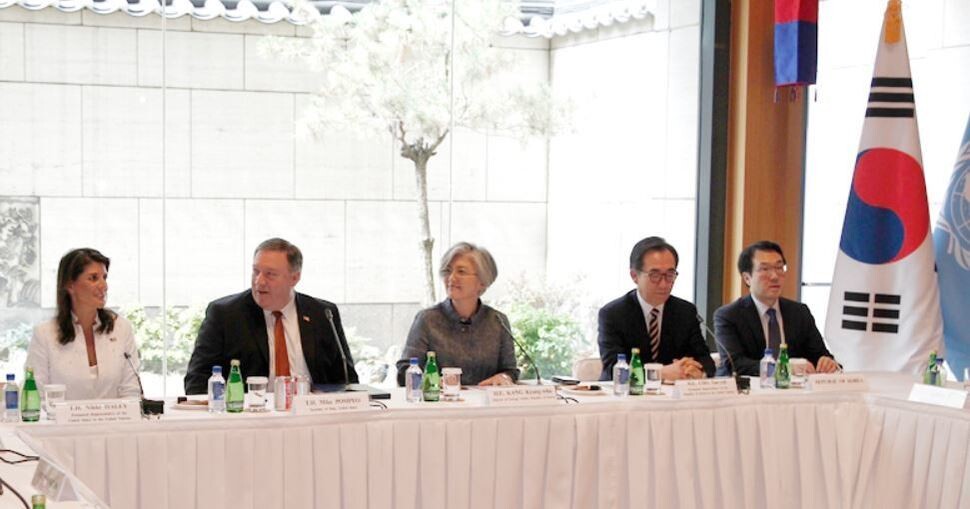hankyoreh
Links to other country sites 다른 나라 사이트 링크
South Korean foreign minister clarifies meaning of her remarks during UNSC briefing

Minister of Foreign Affairs Kang Kyung-wha said in a briefing of UN Security Council member countries on July 23 that previous remarks she had made about North Korea sanctions were intended to “have exceptions to sanctions recognized when necessary for inter-Korean efforts.”
“This is not the stage for lifting [sanctions on North Korea],” she stressed.
The clarification from Kang, who returned to South Korea via International Airport early that morning following a visit to the US, came in response to reports that she had stressed the importance of lifting sanctions during a UNSC member country briefing on July 20 with US Secretary of State Mike Pompeo.
Discussing the issue of partially waiving sanctions as part of the inter-Korean cooperation process, a senior official with the Ministry of Foreign Affairs previously remarked in a July 20 talk with New York correspondents for Kang’s visit to the country that South Korea “needs exceptions [to the sanctions] in some respects as a follow-up measure to the Panmunjeom Declaration between South and North.”
“We are asking that exceptions within the framework of sanctions be recognized in terms of eliciting dialogue and cooperation with North Korea, and we are working on resolving the matter step by step through discussions with the US and the UNSC sanctions committee,” the official explained. The remarks appeared to reflect the likelihood of Seoul having more matters to discuss with the UN and Washington on the issue of sanctions as South and North Korea begin implementing the terms of the Panmunjeom Declaration in earnest.
Following an agreement with North Korea to restore military communication lines at general-level inter-Korean talks on June 14, South Korean President Moon Jae-in applied and received approval for exceptions to sanctions for all areas related to the project from the UNSC North Korea sanctions committee. The first example of South and North Korea being granted UN approval for exceptions to sanctions during their implementation of the Apr. 27 Panmunjeom Declaration, it enabled South Korea to send some previously off-limits items to the North, including optical cables, oil, and vehicles.
“As [inter-Korean cooperation] efforts have become more concrete and numerous, there are now more things to discuss [with regard to North Korea sanctions],” explained a South Korean government official acquainted with the situation in inter-Korean relations.
“But the principle [of maintaining North Korea sanctions] is in place, and the US is well aware [of the situation], so we’re in discussions with the US on how to resolve this,” the official explained.
Another government official explained, “Our position is in favor of maintaining the framework of North Korea sanctions, keeping it in place as we execute certain symbolic efforts that emerged at the inter-Korean summits.”
Kang’s emphasis at the UN briefing on the need for exceptions to sanctions in connection with inter-Korean joint efforts reportedly reflected the stance of South Korean President Moon Jae-in, who supports proactively finding ways for inter-Korean economic cooperation even while sanctions are in place. Depending on the analysis, it could also be read as a move to inject new momentum in currently deadlocked North Korea-US relations through progress in inter-Korean relations.
But Kang was also emphatic that granting exceptions to North Korea sanctions for the sake of inter-Korean cooperation efforts is a different matter from lifting them entirely. In a discussion on July 20, she stressed the “need for the international community to present a unified voice to encourage concrete action from North Korea until complete denuclearization is achieved.”
“There has been a consensus that sanctions must be maintained until complete denuclearization takes place,” she added.
By Kim Ji-eun, staff reporter
Please direct comments or questions to [english@hani.co.kr]

Editorial・opinion
![[Editorial] Yoon must halt procurement of SM-3 interceptor missiles [Editorial] Yoon must halt procurement of SM-3 interceptor missiles](https://flexible.img.hani.co.kr/flexible/normal/500/300/imgdb/child/2024/0501/17145495551605_1717145495195344.jpg) [Editorial] Yoon must halt procurement of SM-3 interceptor missiles
[Editorial] Yoon must halt procurement of SM-3 interceptor missiles![[Guest essay] Maybe Korea’s rapid population decline is an opportunity, not a crisis [Guest essay] Maybe Korea’s rapid population decline is an opportunity, not a crisis](https://flexible.img.hani.co.kr/flexible/normal/500/300/imgdb/original/2024/0430/9417144634983596.jpg) [Guest essay] Maybe Korea’s rapid population decline is an opportunity, not a crisis
[Guest essay] Maybe Korea’s rapid population decline is an opportunity, not a crisis- [Column] Can Yoon steer diplomacy with Russia, China back on track?
- [Column] Season 2 of special prosecutor probe may be coming to Korea soon
- [Column] Park Geun-hye déjà vu in Yoon Suk-yeol
- [Editorial] New weight of N. Korea’s nuclear threats makes dialogue all the more urgent
- [Guest essay] The real reason Korea’s new right wants to dub Rhee a founding father
- [Column] ‘Choson’: Is it time we start referring to N. Korea in its own terms?
- [Editorial] Japan’s rewriting of history with Korea has gone too far
- [Column] The president’s questionable capacity for dialogue
Most viewed articles
- 1Months and months of overdue wages are pushing migrant workers in Korea into debt
- 2At heart of West’s handwringing over Chinese ‘overcapacity,’ a battle to lead key future industries
- 3[Editorial] Yoon must halt procurement of SM-3 interceptor missiles
- 4Fruitless Yoon-Lee summit inflames partisan tensions in Korea
- 5Trump asks why US would defend Korea, hints at hiking Seoul’s defense cost burden
- 6Dermatology, plastic surgery drove record medical tourism to Korea in 2023
- 71 in 3 S. Korean security experts support nuclear armament, CSIS finds
- 8[Editorial] New weight of N. Korea’s nuclear threats makes dialogue all the more urgent
- 9South Korea officially an aged society just 17 years after becoming aging society
- 10[Column] For K-pop idols, is all love forbidden love?